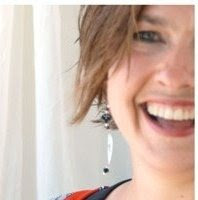One of the pieces of “survivor” identity that I wrangle with is this idea that we must “recover” our voices. I mean the notion that our voices are lost, have been snatched away from us.
The literal truth for most of us is that our voices were always here – and yet swallowing this concept of "lost voice" (en)forces a deep body collusion with the prevailing myths and metaphors of those in power. We internalize the idea that we’re silenced in order, I think, to break free of the reality in fact that we are/were ignored. That there are those who heard what we said, and then just turned their faces away from ours.
I spent years believing that I was silenced, that I
had no voice. The fact is that I was unheard–an important distinction. As is true for most kids, I learned not to tell my complete truth while I was growing up, and then, and, like many millions of children around the world, I was trained in secrecy by a stepfather/rapist who took my (en)forced silence as his birthright, and used it as a weapon against me. How do we who are survivors of abuse (sexual abuse, physical abuse, emotional abuse, psychological abuse) tell our truths in a culture that doesn’t want to really hear people’s words and meanings? We are not heard by abusers who demand a silence they can interpret as “Yes.” We are not heard by a patriarchal, capitalist society that demands our silence so they can overlay our lives with their image of us. We are not heard by a government that usurps women’s tears in order to justify the killing of other women’s sons and daughters.
Sometimes I am left wondering why I should bother trying to communicate at all, when those in power aren’t listening. When I speak, my sentences often come out broken and peculiar, cut off in the middle with long stretches of silence. I stop writing to stare out the window. I stop typing to play with a candle that doesn’t want to stay lit. I stop. That’s their aim.
My aim though, is to start again. After years of internalizing the directives instructing me to
be quiet, be quiet, be quiet, I have begun the work of trusting the true power of my voice. I have come to believe in linguistic border-crossing as a means through which to change the world through a renewed sense of speech, voice, self, embodiment, empowerment. One means through which to enact this change is with a writing practice–a regular, repeated experience of coming to aspects of self through writing, through linguistic risk taking; the placing of self and selves on the page; the attempt to name what cannot be named and what we have been told should not be named. I have used this writing practice to struggle with and against the silences imposed on me, silences I’ve been expected to collude with, to put voice and flesh to experiences and desires–both sexual and not–that were never meant to be articulated.
Sometimes it seems we speak into the wind and feel the craziness of unhearing laying across our face and shoulders like a heavy wet blanket. Our government is at war, killing people for no reason other than money and hatred. Here again is the time and place for our writing, through which we can do difficult work. We are a nation of subjected and silenced people. We are a nation of people trained into the difference of others as reason enough to kill them. Millions of people around the world gathered to declare their opposition to a U.S.-led invasion, and the U.S. invaded anyway. Does this mean that those millions all lost their voices? No–they were ignored.
We are a nation raised on our supremacy–
the United States of America is the greatest country in the world!–and so many of us believe it even as we see the leaders stripping away our bedsheets and clothes, snatching the food from our and our children’s mouths, tearing down our homes, thieving the books from our children’s hands and tossing it all on the bonfires of their war, tossing it all into their own furnaces; selling our bodies on the open market to the highest or most connected bidder and pocketing the money themselves.
If we don’t tell our stories, others will tell them for us, and they will get them wrong. (I’m not the first one to articulate this fact; who said that?) The stories that others tell for and about you will be used to build policy and pathology, will be used to build houses to hide you in / used to build walls to close around you / will be used to build stories to their own ends /
will be used against you. If we do not tell our stories, the stories told about us will be used to our detriment.
Your voice, however it sounds or doesn't, has always been in you, with you, of you,
you. And what happens in the Writing Ourselves Whole workshops, in most Amherst Writers and Artists workshops, is that your words – that relentless creative speech and possibility – are deeply attended to, not pathologized or ensnared in sin or broken down but opened into all it’s matter-of-factness, heard as beauty and majesty or rage, walked through as a garden full of flowers, a pond lily marshside.
Labels: AWA, expressive arts, sexual abuse, silences, survivors, voice, writing ourselves whole, writing workshops


